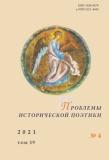«Поэтика» Аристотеля в русских переводах
Poetics of Aristotle in Russian Translations
Author(s): Anna Yurievna NilovaSubject(s): Ancient World, Russian Literature, Ancient Philosphy, 19th Century, Philology, Translation Studies, Theory of Literature
Published by: Петрозаводский государственный университет
Keywords: Aristotle; Poetics; translation; interpretation; terminology of literary criticism; imitation; purification; tragedy; epic; myth; twists and turns; recognition; pathos; passion;
Summary/Abstract: The article presents an overview of the existing translations of Aristotle's “Poetics”, characterizes the features of each of them. In the preface to his translation of Aristotle's “Poetics”, V. Zakharov characterized the work of the Greek philosopher as a “dark text.” Each translation of this treatise, which forms the basis of European and world literary theory, is also its interpretation, an attempt to interpret the “dark places.” The first Russian translation of “Poetics” was made by B. Ordynsky and published in 1854, however, the Russian reader was familiar with the contents of the treatise through translations into European languages and its expositions in Russian. For instance, in the “Dictionary of Ancient and New Poetry” Ostolopov sets out the Aristotelian theory of drama and certain other aspects of “Poetics” very close to the original text. Ordynsky translated the first 18 chapters of “Poetics”, focusing on the theory of tragedy. The translator presented his interpretation of Aristotle’s concept in an extensive preface, commentaries and a lengthy “Statement.” This translation set off a critical analysis by Chernyshevsky, and influenced his dissertation “Aesthetic relations of art to reality”, in which the author polemicizes with the aesthetics of German romanticism. In 1885 V. Zakharov published the first complete Russian translation of “Poetics”, in which he offered his own interpretation of Aristotle's teaching on language and epic. The author of this translation returns to the terminology of romantic aesthetics, therefore the translation itself is outside the main line of perception of the teachings of Aristotle by domestic literary theory, which is clearly manifested in the translations of V. G. Appelrot (1893), N. N. Novosadsky (1927) and M. L. Gasparov (1978). The subject of discussion in these translations was the interpretation of the notions of μῦϑος and παθος, the concepts of mimesis and catharsis, the source of suffering and the tragic, the possibility of modernizing terminology. An important milestone in the perception and assimilation of Aristotle's treatise by Russian literary criticism was its translation by A. F. Losev, which was not published, but was used by the author in his theoretical works and in criticizing other interpretations of “Poetics”. M. M. Pozdnev penned one of the last translations of Poetics (2008). The translator does not seek to preserve the peculiarities of the original style and interprets “Poetics” within the framework and terms of modern literary theory, focusing on its English translations. The main subject of the translator's reflection is Aristotle's understanding of the essence and phenomenon of poetic art. Translations of the Greek philosopher's treatise reflect the history of the formation and development of the domestic theory of literature, its main topics and terminological apparatus.
Journal: Проблемы исторической поэтики
- Issue Year: 19/2021
- Issue No: 4
- Page Range: 7-39
- Page Count: 33
- Language: Russian

